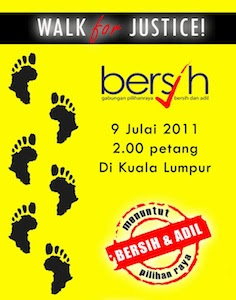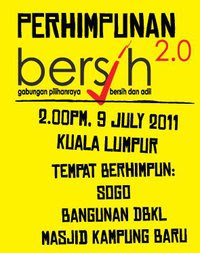 By Kim Quek
By Kim QuekAmidst the frenzy of draconian measures to prevent the July 9 Bersih rally from taking place, many Malaysians have begun to wonder: Has Malaysia descended into a state of lawlessness?
No sooner had Home Minister declared that wearing the yellow Bersih T-shirt was illegal, the Inspector General of Police up the ante by announcing that even “shoes, cars, buses or any medium that promote the Bersih rally are illegal, as this amounts to sedition”, and he said the people involved will be arrested.
To date, more than a hundred people have been arrested all over the country in the past four days, mainly for wearing the yellow Bersih shirts.
To me, this sounds like someone speaking and acting as if he is the absolute monarch who can order the arrest of anyone at his whims, and whose word is law. For nowhere in the Malaysian law can you find a provision that allow a minister or a police officer to declare an item such as the Bersih shirt illegal or to arrest someone before a crime is committed or suspected to have been committed. The Bersih rally is not even held, so how can a crime be committed in connection with the rally?
BERSIH ABOVE BOARD
So, what has driven the Minister and the IGP into such extreme conduct of resorting to brazenly unlawful exercise of power?
Is Bersih a terrorist organization that plots to overthrow the government by violence? Is Bersih calling people to break laws and create chaos? What terrible deeds have Bersih done to cause such phobia in the authorities that they should strike at everything that moves, so to speak, that smells of Bersih?
None of that.
Bersih is a civil society movement participated by sixty two non-government organizations to campaign for electoral reforms. . And the July 9 rally is specifically called to address the problem of the authorities’ recalcitrance to institute any form of reform. Despite persistent requests over many years, the Election Commission and the incumbent ruling coalition Barisan Nasional have not moved even one inch towards reforming an electoral system that has been reduced to a complete farce through ever escalating vote-buying, abuse of power and massive rigging.
With such noble intention, how could Bersih be branded as anything other than a respectable body that works towards restoration of democracy and return of political power to the people? It should be obvious by now that without free and fair election, political power is vested in a few incumbent leaders, not with the people.
And when such a respectable body calls for a rally to highlight its cause to the nation, how can such a rally be taboo, and everything connected with it be decreed illegal?
Up to now, the incumbent hegemon Umno and the police have not come up with an iota of credible evidence that the Bersih rally is anything but a peaceful and honourable gathering, called in accordance with the right endowed by the Constitution to every citizen. Regretably, the police have so far conducted themselves as a force serving Umno’s parochial political interests, in direct confrontation with the interests of the masses.
AUTHORITIES’ EXCUSES INCREDULOUS
The excuses given so far to justify arrest and to label the rally illegal are laughable and carry no credibility – accusations such as a communist plot to wage war against the Agong, a movement aided by foreign Christian bodies to subvert the country, an event that will jeopardize public order and national security, and cause economic damage.
These tales of impending threats and calamities are so far-fetched that they are not only disbelieved by decent Malaysians, but also reflect the paucity of rationale of the incumbent power to justify their condemnation and clampdown on the movement.
That their excuses to crucify the Bersih rally are rubbish is amply manifested in the admirable political and economic well being of those democratic countries where such peaceful rallies are part and parcel of their democratic way of life. Look at our regional neighbor Hong Kong. Rallies of a few hundred thousand people to demonstrate against the Hong Kong or Chinese government are routinely staged there, and yet there was not the slightest indication that public order was affected or businesses harmed. On the contrary, Hong Kong continues to enjoy ever increasing prosperity and stability.
So, what is Umno afraid of?
The honest truth and the bottom line is: Umno has no confidence to politically survive a free and fair election.
That is why it has not yielded an inch in the direction of moving Malaysian election to a more level-playing field, and it has no intention to do so in the future.
Umno also realizes that it has committed too many wrongs that betray the people’s interest, and more people have come to know of these through the fast growing alternative media. Combined with the growing influence of opposition alliance Pakatan Rakyat, the coming rally could be a powerful demonstration of the people’s will to reclaim sovereignty from the long-reigning kleptocracy through electoral reforms.
That is something that Umno does not want to see happening.
NO WIN FOR UMNO
We can hence expect that Umno will continue to step up pressure against Bersih by manipulating compliant institutions such as police and judiciary, at the expense of the Constitution and law, to stifle the Bersih move.
But Umno is in a no-win situation. To be faithful to the Constitution which means that the peaceful rally must be allowed to proceed, Umno dreads to see a mammoth assembly that could be demoralizing to its dwindling supporters. On the hand, a brutal repression that breaks all laws may kindle public fury to an explosive state with unpredictable consequences. Even if it succeeds in suppressing the rally, it can only bring temporary relief to Umno, as the ugly scenes of unjustified cruelty and transgression of law and fundamental human rights will be mercilessly bared for all to see, thanks to modern IT technology, reminiscent of the Tahrir square uprising and the subsequent revolutionary fire that has spread across the entire Arab world. By that time, Umno and BN’s popular support may have so dwindled that even the status quo of skewed election and stooge institutions cannot save it from an electoral defeat.
I am confident that the majority of Malaysians has already reached such a level of political consciousness that the will of the people will prevail to make July 9 rally an important turning point in our struggle to reclaim democracy and sovereignty for the people.






























